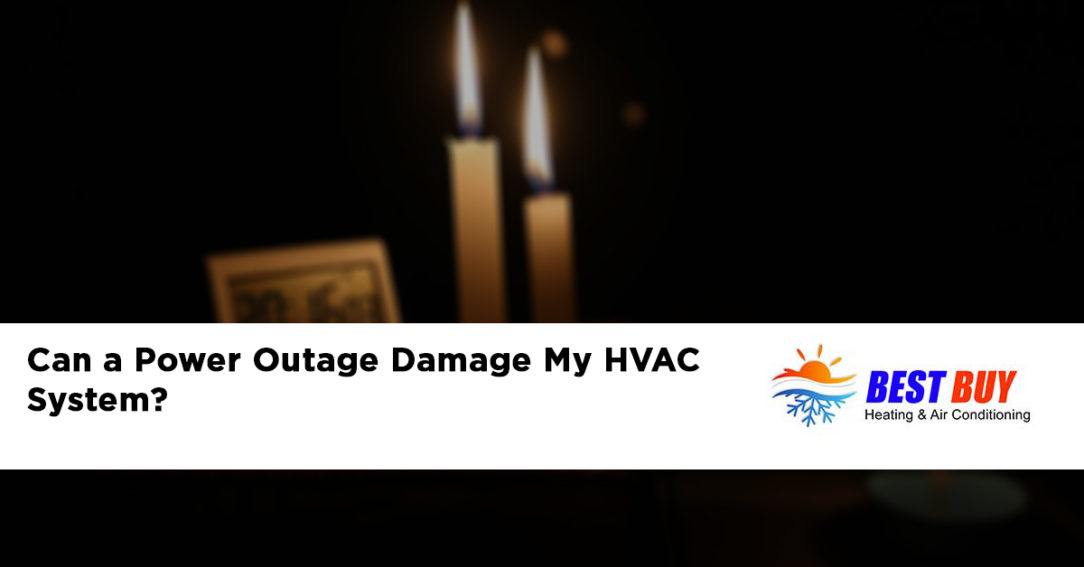While it’s unlikely, yes, it is possible that a power outage—or a power surge, which is different—can damage your HVAC system.
In today’s post on the Best Buy Heating and Air blog, we’ll be discussing the differences between a power outage and a power surge, why the latter usually has more potential to damage your system, and what you can do to prevent these problems and protect your HVAC system.
Let’s dig in with some of the basics:
The Difference Between a Power Outage and a Power Surge and Why it Matters

A power outage is the type of power problem most of us are familiar with, especially here in Northern Colorado during particularly bad winters. Basically, a power outage is just the terminology we use to describe when there’s no electricity available in your residence or business.
Sometimes this can be a problem with your equipment (e.g., faulty wiring), but more often than not it’s an issue with equipment owned by the power company and the best you can do is simply wait for them to fix it. In the following section, we’ll discuss what you should do to protect your HVAC system during a power outage.
A power surge is different than a power outage. This is the terminology we use to describe when there’s too much power flowing to a home or business. This scenario has more potential for damage than the typical power outage, because too much electricity flow can damage the internal components of electronic devices, and that includes the electronics in your HVAC system.
Let’s take a look at how to protect your system as best as possible from these two scenarios:
How to Protect Your HVAC System During a Power Outage
Protecting your HVAC system during a power outage is easy and only requires taking a few simple steps.
The first thing to do is make sure that your thermostat is switched to the off position—this will prevent your heating or air conditioning from “kicking on” again once power is restored. At this point, you’re done—just wait for the power to come back on.
Once the power comes back on, go to your home’s breaker box. Turn the breaker for the HVAC system off, wait a moment, and then turn it back on. The purpose of this is to reset the circuit breaker in your air conditioner, ensuring that everything is functioning optimally there too.
Wait a few more minutes, and then go ahead and turn your system back on. If everything is working normally, you most likely escaped any damage due to the power outage.
How to Protect Your HVAC System From a Power Surge

As we discussed earlier, a power surge has a bit more potential for damage than a simple power outage. However, the steps you take to protect your equipment are much the same (except for one key addition, which we’ll discuss in a moment).
If your home is experiencing power surges, you’ll also want to make sure that your thermostat is switched to off. You can also disable the HVAC system at the home breaker until the power surges are over. While you’re at it, go around and unplug other electronic devices and appliances throughout your home to prevent any possible damage to those too.
Finally, consider installing a volt surge protector for your HVAC system. This is very similar to the regular, small power strips you may already use for your standard-voltage electronic devices, except “bigger.” Volt surge protectors are designed for 220 volt appliances, like your HVAC system.
Best Practices for Preventing Power Surges in Your Home or Business
Like a power outage, power surges may be more or less unavoidable and ultimately need to be repaired by your electricity provider. However, they should be relatively rare—if you’re experiencing frequent power surges, it may have something to do with the electrical wiring in your home. Having an electrician inspect your wiring is your best be to protecting your HVAC system and the rest of your home.
Think You May Have an Electrical Problem With Your HVAC System? We’re Here to Investigate For You
If you’d like to learn more about how to protect your HVAC system from electrical problems and any other possible damage, we’re here to help you get the most out of your existing system for as long as possible. If it’s time for an upgrade, we can help with that too. Please feel free to reach out to us at (970) 218-0414 or schedule a service appointment at your earliest convenience. Remember—proper HVAC maintenance can save you thousands.
